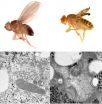(Press-News.org) WHAT:
Secondary infections with bacteria such as Streptococcus pneumoniae, which causes pneumonia, were a major cause of death during the 1918 flu pandemic and may be important in modern pandemics as well, according to a new article in the Journal of Infectious Diseases co-authored by David M. Morens, M.D., senior advisor to the director of the National Institute of Allergy and Infectious Diseases, part of the National Institutes of Health.
The researchers examined 13 studies published between 1918 and 1920. During this time, many scientists erroneously believed that influenza was caused by bacteria, not a virus. As a result, researchers began performing and publishing results from clinical trials testing bacterial vaccines designed to prevent the flu. In their new study, Dr. Morens and his colleagues used modern statistical and evaluation methods to re-analyze the vaccine effectiveness data from these old studies in an attempt to correct for any statistical biases in the original analysis.
In addition to confirming the importance of bacterial infections associated with the 1918 influenza pandemic, the new analysis suggests that the use of bacterial vaccines containing S. pneumoniae could reduce pneumonia rates and deaths in modern influenza pandemics as well. During the 2009-2010 H1N1 influenza pandemic, the authors write, autopsy results implicated bacterial infections in 29 to 55 percent of deaths. In light of this study, the authors recommend more research into the use of bacterial vaccines to prevent illness and death associated with influenza.
INFORMATION:
ARTICLE:
Y-W Chien et al. Efficacy of bacterial vaccines in preventing pneumonia and death during the 1918 influenza pandemic. Journal of Infectious Diseases. DOI: 10.1086/657144 (2010).
WHO:
David M. Morens, M.D., Senior Advisor to the Director, NIAID, is available to comment on this article.
CONTACT:
To schedule interviews, please contact Nalini Padmanabhan, 301-402-1663, niaidnews@niaid.nih.gov.
More information about NIAID research on flu is available at the NIAID Influenza Web portal (http://www.niaid.nih.gov/topics/flu/Pages/default.aspx).
NIAID conducts and supports research—at NIH, throughout the United States, and worldwide—to study the causes of infectious and immune-mediated diseases, and to develop better means of preventing, diagnosing and treating these illnesses. News releases, fact sheets and other NIAID-related materials are available on the NIAID Web site at http://www.niaid.nih.gov.
The National Institutes of Health (NIH)—The Nation's Medical Research Agency—includes 27 Institutes and Centers and is a component of the U. S. Department of Health and Human Services. It is the primary federal agency for conducting and supporting basic, clinical and translational medical research, and it investigates the causes, treatments and cures for both common and rare diseases, For more information about NIH and its programs, visit http://www.nih.gov.
New study re-examines bacterial vaccine studies conducted during 1918 influenza pandemic
2010-11-03
ELSE PRESS RELEASES FROM THIS DATE:
Gastric bypass alters sweet taste function
2010-11-03
Gastric bypass surgery decreases the preference for sweet-tasting substances in obese rats, a study finding that could help in developing safer treatments for the morbidly obese, according to Penn State College of Medicine researchers.
"Roux-en-Y gastric bypass surgery is the most common effective treatment for morbid obesity," said Andras Hajnal, M.D., Ph.D., associate professor, Department of Neural and Behavioral Science and Surgery. "Many patients report altered taste preferences after having the procedure."
This surgery involves the creation of a small gastric ...
The Scientist's Life Science Salary Survey 2010 -- results announced
2010-11-03
This year's Salary Survey saw drops in salaries across the board with almost every speciality suffering a setback, some with dips as large as $20,000 (ecology) and $28,000 (virology).
However, a few select fields, namely bioinformatics, biophysics, biotechnology, and neuroscience, bucked the trend and actually posted salary increases this year. Whilst it is not easy to determine why these specialities saw salaries rise and others saw salaries cut, Mark Musen, head of the Stanford Center for Biomedical Informatics Research at Stanford University commented: "I've noticed ...
Antibody locks up West Nile's infection mechanism
2010-11-03
WEST LAFAYETTE, Ind. - Researchers have learned the structure that results when an antibody binds to the West Nile virus, neutralizing the virus by locking up its infection mechanism. The information could help scientists develop a vaccine against the mosquito-borne disease.
The findings show precisely how a key part of the antibody, called the antigen binding fragment, or Fab, attaches to two adjacent protein molecules that make up the virus's outer shell. This "crosslinking" attachment between molecules is repeated over the entire shell, interlocking the 30 molecular ...
Daily dose of beet juice promotes brain health in older adults
2010-11-03
Winston-Salem, N.C. – Researchers for the first time have shown that drinking beet juice can increase blood flow to the brain in older adults – a finding that could hold great potential for combating the progression of dementia.
The research findings are available online in Nitric Oxide: Biology and Chemistry, the peer-reviewed journal of the Nitric Oxide Society and will be available in print soon. (Read the abstract.)
"There have been several very high-profile studies showing that drinking beet juice can lower blood pressure, but we wanted to show that drinking beet ...
Severely injured should go directly to trauma center: Research
2010-11-03
TORONTO, Ont., Nov. 2, 2010-Severely injured patients should be transported directly from the scene of an accident to a trauma center, even if it means bypassing a closer hospital, according to new research that shows this results in a nearly 25 per cent lower death rate.
However, even though 80 to 85 per cent of people in North America live within a one-hour drive or flight of a trauma center, 30 to 60 per cent of severely injured patients are still taken to the nearest hospital.
Researchers led by Dr. Avery Nathens, trauma director at St. Michael's Hospital in Toronto, ...
Scientists at IRB Barcelona discover a new protein critical for mitochondria
2010-11-03
A study by the team headed by Lluís Ribas de Pouplana, ICREA professor at the Institute for Research in Biomedicine (IRB Barcelona), has been chosen as "Paper of the week" in the December issue of the Journal of Biological Chemistry, which is already available online. The article describes the discovery of a new protein in the fly Drosophila melanogaster (fruit fly) that is crucial for mitochondria. The removal of SLIMP in these flies leads to aberrant mitochondria and loss of metabolic capacity, thus causing death.
The study, whose first author is Tanit Guitart, a PhD ...
Brain's ability to selectively focus/pay attention diminishes with age
2010-11-03
A University of Toronto study shows that visual attention -- the brain's ability to selectively filter unattended or unwanted information from reaching awareness -- diminishes with age, leaving older adults less capable of filtering out distracting or irrelevant information.
Further, this age-related "leaky" attentional filter fundamentally impacts the way visual information is encoded into memory. Older adults with impaired visual attention have better memory for "irrelevant" information. The research, conducted by members of U of T's Department of Psychology, will ...
Shift work linked to higher risk of work injury: UBC study
2010-11-03
Canadians who work night and rotating shifts are almost twice as likely to be injured on the job than those working regular day shifts, according to a study by researchers at the University of British Columbia.
The study, published in the current issue of the Scandinavian Journal of Work, Environment and Health, examined data on more than 30,000 Canadians collected as part of Statistics Canada's Survey of Labour and Income Dynamics and compared results between workers involved in different types of shift work from 1996-2006. It shows that while the overall rate of work ...
Every person emits 2 tons of CO2 a year through eating
2010-11-03
Every person emits the equivalent of approximately two tonnes of carbon dioxide a year from the time food is produced to when the human body excretes it, representing more than 20% of total yearly emissions. That is what a study by the Universidad de Almería says, confirming for the first time that human excrements contribute to water pollution, primarily with nitrogen and phosphorus.
A team of researchers from the Universidad de Almería (UAL) has estimated the environmental impact of the Spanish diet and role that human excrements play in the life cycle of food. It is ...
Algae for biofuels: Moving from promise to reality, but how fast?
2010-11-03
A new report from the Energy Biosciences Institute (EBI) in Berkeley projects that development of cost-competitive algae biofuel production will require much more long-term research, development and demonstration. In the meantime, several non-fuel applications of algae could serve to advance the nascent industry.
"Even with relatively favorable and forward-looking process assumptions (from cultivation to harvesting to processing), algae oil production with microalgae cultures will be expensive and, at least in the near-to-mid-term, will require additional income streams ...


